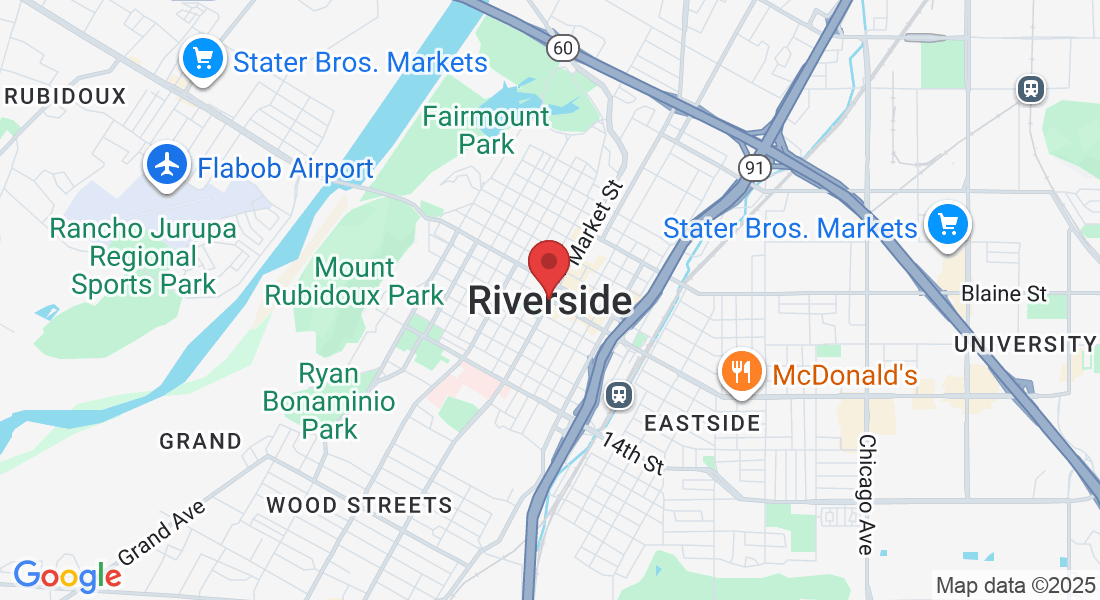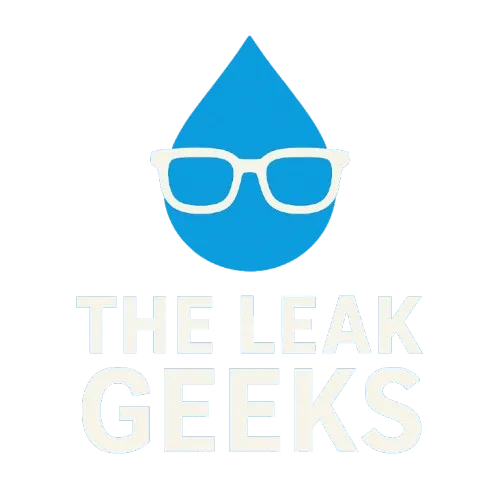
🚨 24/7 EMERGENCY SERVICE
You Shouldn't Have to BEG a Plumber to Call You Back
Welcome to Leak Geeks Plumbing, where quality service meets exceptional expertise. Whether you're dealing with a pesky leak, a clogged drain, or planning a complete bathroom renovation, we're here to help.
FAST & AFFORDABLE SERVICE
LICENSED & INSURED
SAME-DAY SERVICE
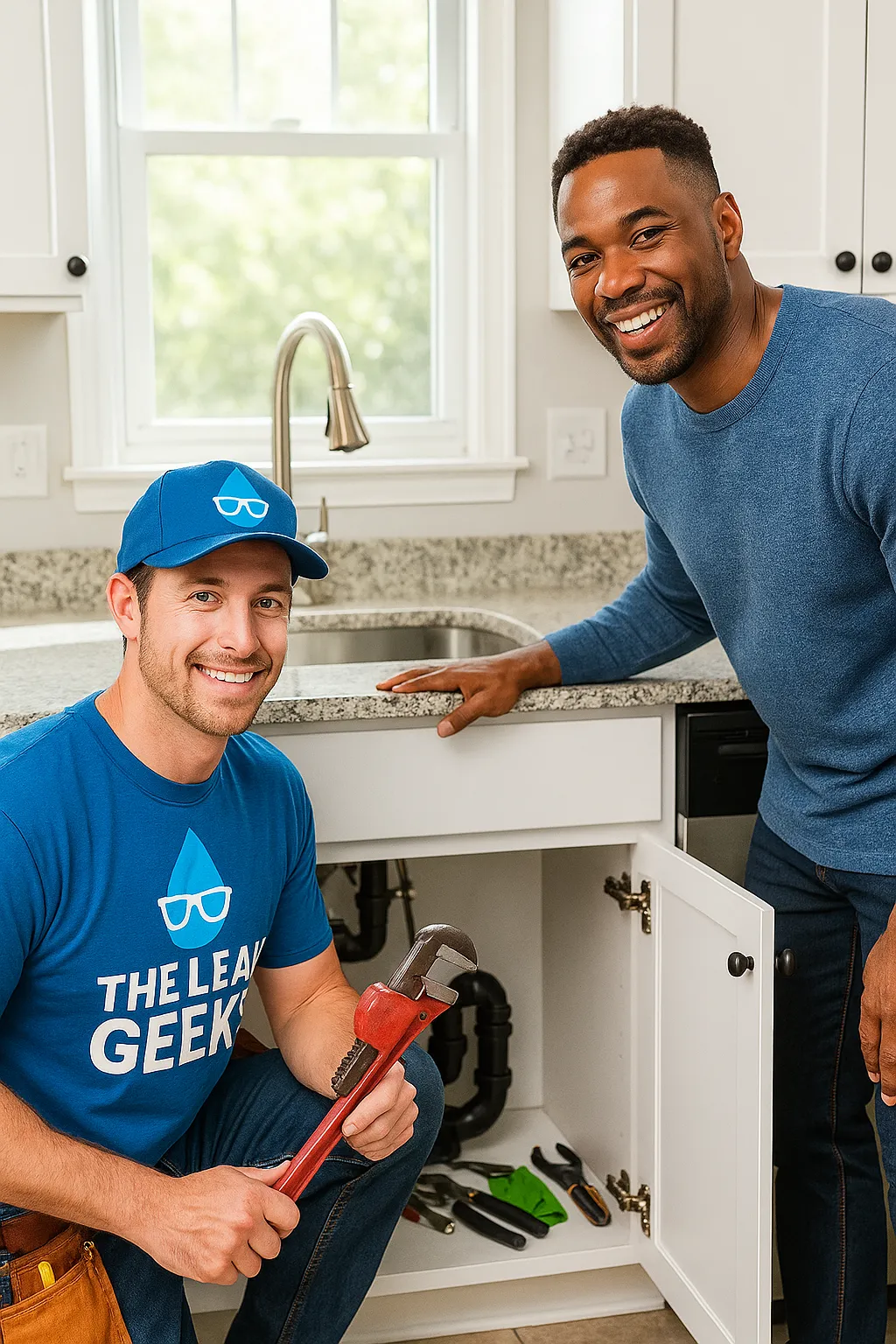
🛡️Our Iron-Clad Guarantee
Upfront Pricing - No hidden fees, ever
On-Time Promise - Late? Your service call is 30% OFF
Done-Right Guarantee - We fix it right or come back FREE
★★★★★
"Finally found an honest plumber! They showed up exactly when they said they would, gave me an upfront price with no surprises, and fixed my drain perfectly. Will definitely use them again."
- Maria Rodriguez, Riverside
Tired of Plumbers Who Don't Show Up, Overcharge, or Leave You Hanging?
If you've been burned before, you're not alone. Here's what makes us different:
😤 "They Never Showed Up"
Our Solution: On-time guarantee with live GPS tracking. You'll know exactly when we're arriving, and if we're late, your service call is completely FREE.
💸 "They Hit Me With Hidden Fees"
Our Solution: Flat-rate pricing quoted BEFORE we start. No hourly charges, no surprises, no "Oh, by the way..." fees. What we quote is what you pay.
🔧 "It Broke Again Next Week"
Our Solution: We fix it right the first time with a written warranty. If the same issue happens again within 30 days, we come back FREE.
📞 "Nobody Answers the Phone"
Our Solution: Live answer 24/7/365. No voicemail jail, no "call back tomorrow." When water is flowing where it shouldn't, we pick up on the first ring.
🤔 "I Feel Like I'm Being Scammed"
Our Solution: No pushy upsells. We only recommend what you genuinely need and explain exactly why. Your trust is worth more than any single sale.
🏠 "They Left My House a Mess"
Our Solution: Shoe covers, floor protection, and complete cleanup. We treat your home like our own and leave it cleaner than we found it.
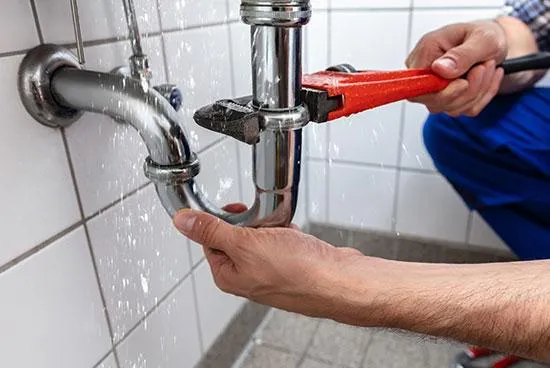
Leak Detection and Repair
Even a small leak can lead to significant damage if left untreated. Our leak detection and repair services
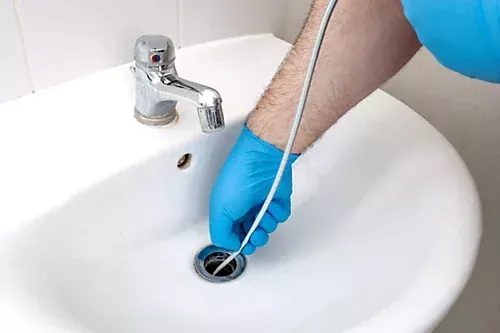
Drain Cleaning
Clogged drains can disrupt your daily routine and cause unpleasant odors and backups. Our drain cleaning services
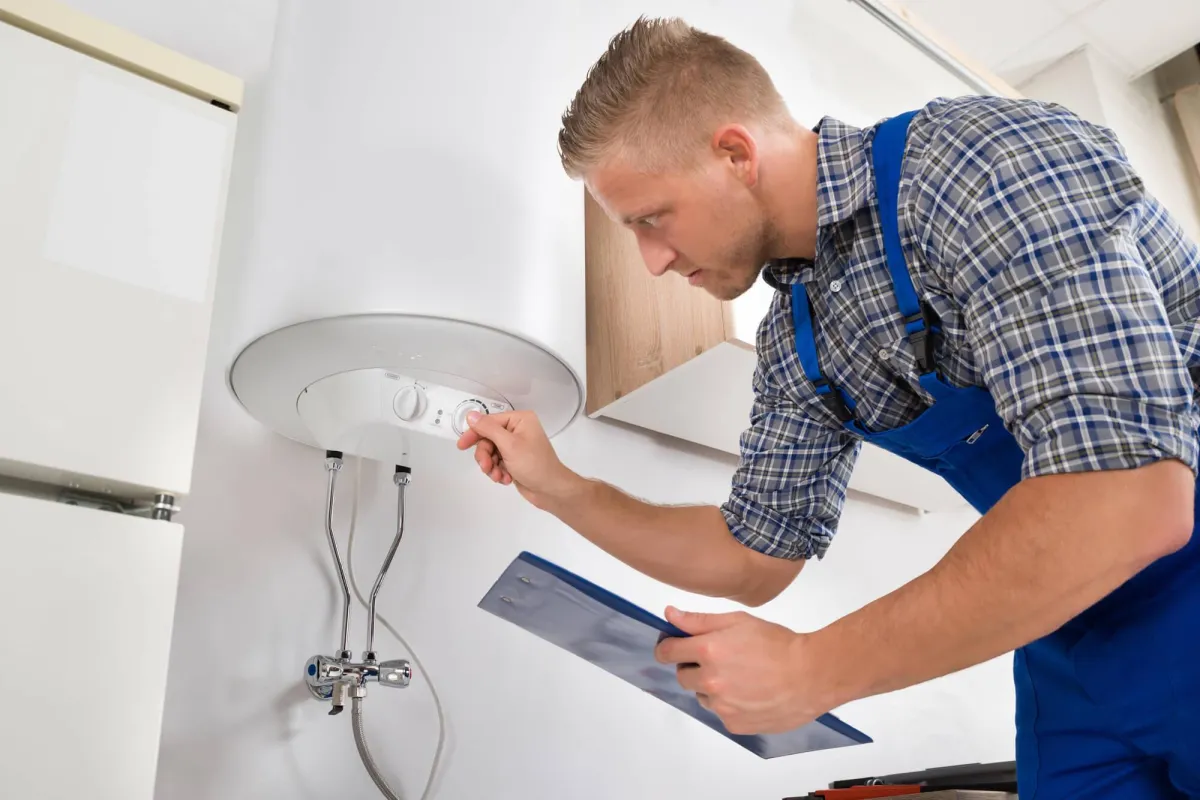
Water Heater Installation
Hot water is essential for everyday comfort, and our team is here to ensure your water heater is functioning at its best

Pipe Repair
When it comes to pipe repair, we handle everything from minor leaks to significant pipe bursts with precision and care. Our expert plumbers use advanced diagnostic tools to identify the root cause of the problem and implement effective repairs that restore your plumbing system’s functionality. .

Emergency Plumbing Services
Plumbing emergencies can arise at any time, which is why we offer 24/7 emergency plumbing services. From burst pipes to severe leaks, our team is ready to respond swiftly and effectively to minimize damage and restore your plumbing system. We understand the urgency of these situations and provide prompt, reliable solutions to get your home or business back to normal as quickly as possible.

Preventative Maintenance
Regular preventive maintenance is crucial to keeping your plumbing system in optimal condition and avoiding costly repairs. Our maintenance services include thorough inspections, cleaning, and routine check-ups designed to catch potential issues before they become major problems.
Inland Empire, CA
Service Areas In The Inland Empire
At The Leak Geeks Plumbing, we proudly serve a wide range of communities throughout The Inland Empire, CA (Riverside, San Bernardino, Ontario, Fontana, Eastvale, Corona, Rancho Cucamonga). Our commitment to providing exceptional plumbing services extends across various neighborhoods and towns, ensuring that residents and businesses alike have access to top-quality plumbing solutions. Whether you’re in a bustling urban area or a quiet suburban neighborhood, our team is equipped to handle your plumbing needs with expertise and professionalism.
★★★★★
"My water heater died on the coldest day of the year and I have three kids who were NOT happy about cold showers. LeakGeeks came out same day and the technician spent 20 minutes trying to fix it before recommending replacement - most plumbers would have just said 'you need a new one' immediately. When we did need a new unit, they explained all my options without pressure and helped me pick one that fit my budget. Installation was clean and professional. They even hauled away the old unit for free. Six months later and still working perfectly. Fair pricing, honest service, and they actually show up when they say they will!"
- Jennifer Walsh, Corona
Ready To Experience Honest Plumbing?
Join hundreds of Inland Empire families who found their "go-to" plumber.
Same honest pricing for everyone - whether you live in a mobile home or a mansion.
Available 24/7 • Up-front Pricing
Blog Posts
5 Slab Leak Warning Signs Every Inland Empire Homeowner Should Know
Last month, we got a panicked call from a Corona homeowner: "There's a warm spot on my kitchen floor and my water bill doubled!" What started as a mysterious warm patch turned into a $3,200 slab leak repair that could have been caught much earlier.
Slab leaks are one of the most expensive plumbing problems in the Inland Empire, but they don't happen overnight. Here are the warning signs we wish every homeowner knew.
What Is a Slab Leak?
A slab leak occurs when water lines under your concrete foundation crack or burst. In the IE, our clay soil and temperature extremes make homes especially vulnerable to foundation shifting that can stress underground pipes.
Warning Sign #1: Unexplained High Water Bills
The Story: A Riverside family ignored their water bill jumping from $80 to $240 over three months. "We thought the city made a mistake," they told us. When we found the leak, thousands of gallons had been flowing under their foundation for months.
The Fix: Electronic leak detection pinpointed the exact location. We used our minimally invasive tunneling method to repair the copper line without tearing up their entire kitchen floor.
How to Avoid This: Check your water meter before bed, then again in the morning without using any water. If it moved, you have a leak somewhere.
Warning Sign #2: Warm or Cold Spots on Floors
The Story: A San Bernardino homeowner called us about a "mystery warm spot" near their water heater. They'd been enjoying the free floor heating for weeks before realizing it meant trouble.
The Fix: We used thermal imaging to trace the hot water line leak under the slab. Our slab leak repair crew accessed the pipe through the garage, avoiding any interior demolition.
How to Avoid This: Walk your floors regularly, especially near water heaters and main bathroom areas. Temperature changes you can feel through flooring almost always indicate leaking pipes.
Warning Sign #3: Low Water Pressure Throughout the House
The Story: An Ontario family thought their whole-house pressure loss was normal aging. "The shower barely had any pressure," they explained. The real culprit was a major slab leak that had been diverting water for months.
The Fix: After confirming the slab leak with our electronic detection equipment, we installed a new water line that restored full pressure and eliminated the underground leak.
How to Avoid This: If multiple fixtures lose pressure simultaneously, don't assume it's normal. This often indicates a major leak between your meter and house.
Warning Sign #4: Sounds of Running Water When Everything's Off
The Story: A Rancho Cucamonga homeowner heard water running in their walls at night. "I thought I was going crazy," she said. The sound was water from a slab leak flowing under the foundation.
The Fix: Our camera inspection located the breach in the main line. We used our trenchless repair method to fix the pipe without destroying the landscaping.
How to Avoid This: Turn off all water in the house and listen carefully. If you hear water moving, you likely have a hidden leak that needs immediate attention.
Warning Sign #5: Cracks in Walls or Foundation
The Story: A Fontana homeowner noticed hairline cracks appearing in their kitchen wall. Six months later, water started seeping through the foundation. The slab leak had been undermining the foundation's stability.
The Fix: This required both slab leak repair and foundation stabilization. We coordinated with foundation specialists to ensure a complete solution.
How to Avoid This: Document any new cracks with photos and dates. Foundation changes can indicate water damage happening underground.
DIY Detection Tips
The Meter Test: Turn off all water in your home, check your water meter and note the position, wait 2 hours without using any water, then check the meter again. If it moved, you have a leak.
When to Call for Professional Slab Leak Detection?
Don't wait if you notice multiple warning signs together, sudden changes in water pressure or bills, any visible water where it shouldn't be, or sounds of water movement when everything's off.
Cost Comparison: Early Detection vs. Emergency Repair
Early Detection and Repair costs $800-1,500, Emergency Slab Leak with Damage costs $3,000-8,000, and Foundation Damage from Ignored Leaks costs $10,000 or more.
Don't let a small leak become a major disaster. If you're experiencing any of these warning signs, call us for professional slab leak detection. We'll pinpoint the problem and give you options that won't break the bank.
Water Heater Warning Signs: How We Saved One Family $3,000 (And How You Can Too)
"It was making weird noises for months, but we thought that was normal." That's what a Riverside homeowner told us right before their 8-year-old water heater completely failed, flooding their garage and requiring emergency replacement during a holiday weekend.
What could have been a planned $1,200 water heater replacement became a $4,200 emergency repair with water damage cleanup. Here's how to avoid their costly mistake.
The $3,000 Mistake: A Real Story
The Call: Sunday morning, water heater burst, flooding garage
The Damage: Ruined holiday plans, damaged stored items, emergency service rates
The Preventable Signs They Ignored: Rumbling and popping sounds for 6 months, rusty water from hot taps, pilot light going out frequently, and a small puddle that "dried up on its own."
Our Emergency Fix: New water heater installation, water damage cleanup, holiday weekend rates
What It Could Have Cost: Planned replacement would have been $1,200 vs. $4,200 emergency
Warning Sign #1: Strange Noises (Rumbling, Popping, Banging)
What It Means: Sediment buildup at the bottom of your tank. In the IE's hard water, this happens faster than other areas.
The Story: A Corona homeowner called us about "sounds like a freight train" from their water heater. When we drained it, we removed 15 gallons of sediment - basically rocks at the bottom of their tank.
The Fix: We flushed the system and replaced the heating elements. Cost: $300. If they'd waited, they would have needed full water heater replacement.
Prevention Tip: Annual flushing removes sediment before it causes damage. In hard water areas like ours, this can double your water heater's lifespan.
Warning Sign #2: Rusty or Discolored Hot Water
What It Means: Internal tank corrosion or sacrificial anode rod failure
The Story: A San Bernardino family ignored rusty hot water for months, thinking it was "just the pipes." When we inspected, the anode rod was completely dissolved and the tank was corroding.
The Fix: We caught it just in time. Anode rod replacement and system flush for $200 saved them from a $1,500 tank replacement.
Prevention Tip: Check your anode rod every 3-4 years in hard water areas. This $40 part protects your entire $1,200+ investment.
Warning Sign #3: Inconsistent Water Temperature
The Story: An Ontario homeowner complained about "cold showers in the morning, scalding at night." They assumed it was normal aging. Actually, their heating element was failing intermittently.
The Fix: Single heating element replacement restored consistent temperature. Cost: $180 including labor.
What They Avoided: Complete water heater replacement when the remaining element failed under the stress of doing double duty.
Warning Sign #4: Higher Energy Bills
The Story: A Rancho Cucamonga family's electric bill jumped $40/month over six months. They blamed summer heat, but their water heater was working overtime due to sediment insulation and failing components.
The Fix: Complete water heater maintenance including flushing, element replacement, and thermostat calibration brought their bills back down.
Energy Savings: $480/year in reduced electrical costs paid for the maintenance in two months.
Warning Sign #5: Small Leaks or Water Around the Unit
What It Means: Tank integrity failure or connection problems
The Story: A Fontana homeowner ignored a "tiny drip that evaporates" under their water heater. Over months, this small leak corroded the tank mounting and damaged the garage floor.
The Emergency: The small drip became a major rupture on a Friday night, requiring emergency service and garage floor repair.
Prevention Lesson: Small leaks always get bigger. Address them immediately to avoid major damage.
Water Heater Maintenance That Actually Prevents Problems
Annual Flushing Process: Turn off power/gas and water supply, attach hose to drain valve, drain tank completely to remove sediment, then refill and restart system.
In the IE's hard water, this simple maintenance can extend lifespan from 6-8 years to 10-12 years.
Repair vs. Replace Decision Guide
Consider Repair When: Unit is under 8 years old, single component failure, repair cost under 50% of replacement, and tank structure is sound.
Plan Replacement When: Multiple component failures, age over 10 years, tank leaks or corrosion visible, and repair costs approaching 70% of replacement.
Cost Comparison: Maintenance vs. Emergency
Annual Maintenance costs $150-200, Preventive Replacement costs $1,200-1,800, Emergency Replacement costs $2,000-3,500, and Emergency plus Water Damage costs $3,000-6,000 or more. The Riverside family's story we opened with could have had a different ending. Annual maintenance would have caught the sediment buildup. Anode rod replacement would have prevented tank corrosion. Addressing the small leak would have prevented the catastrophic failure.
Don't let your water heater surprise you with an expensive emergency. Watch for these warning signs, and call us for maintenance before small problems become big disasters.
Remember: Water heaters don't usually fail without warning - they give you months of signs. The key is recognizing what your water heater is trying to tell you and acting before it's too late.
